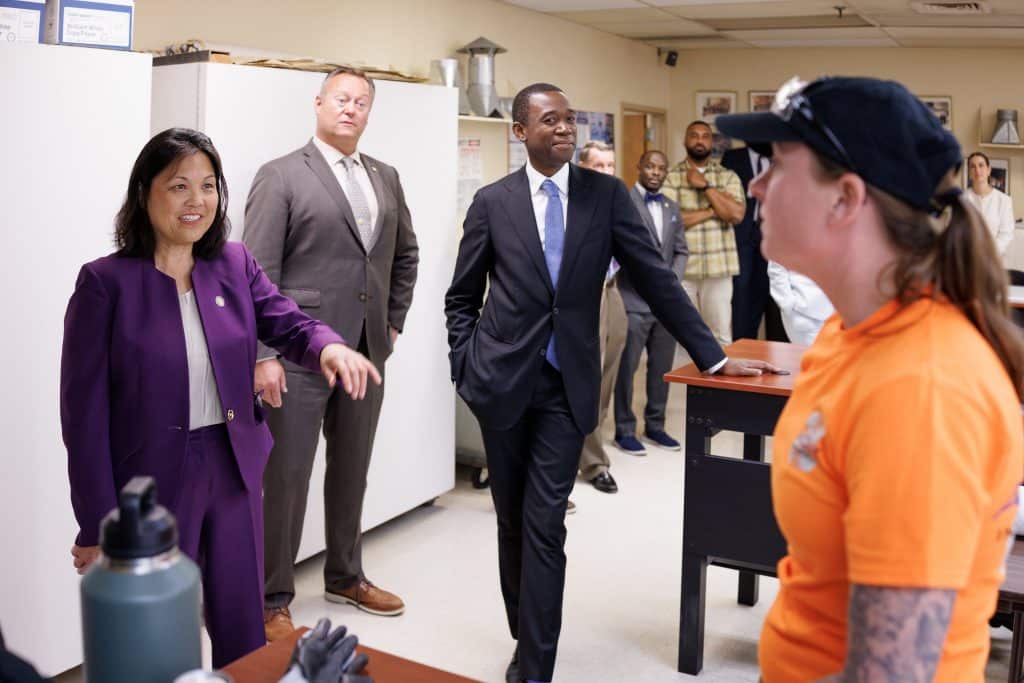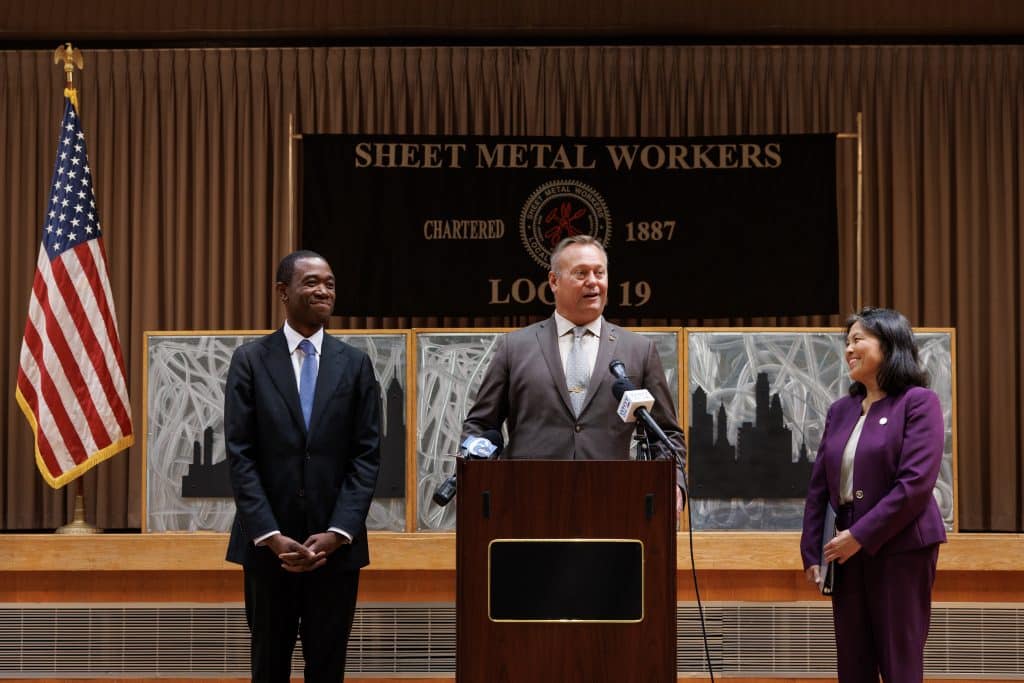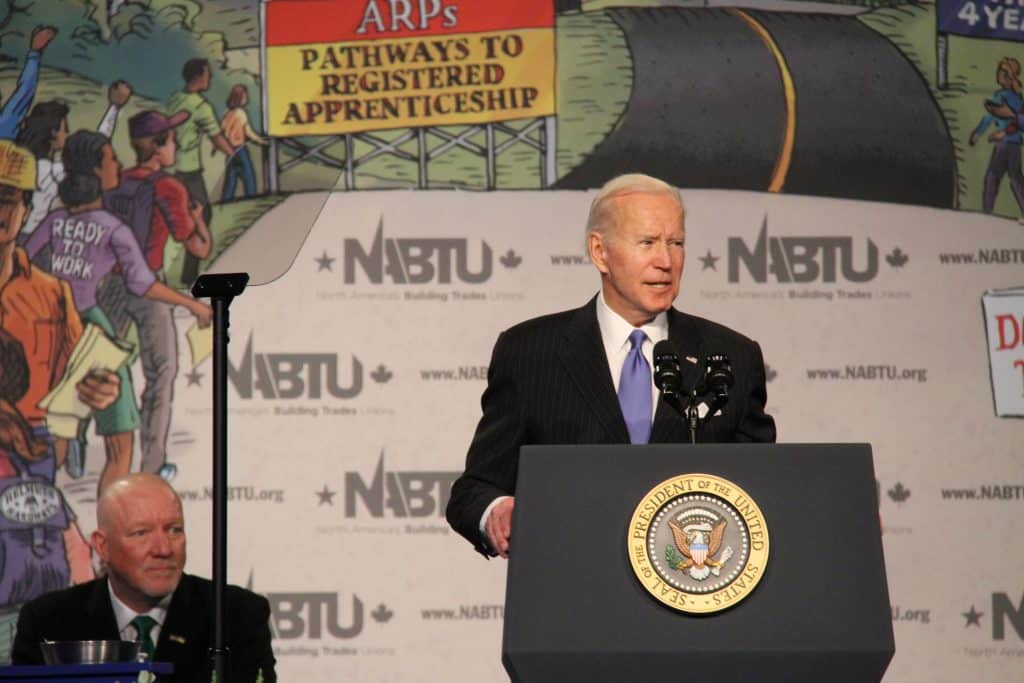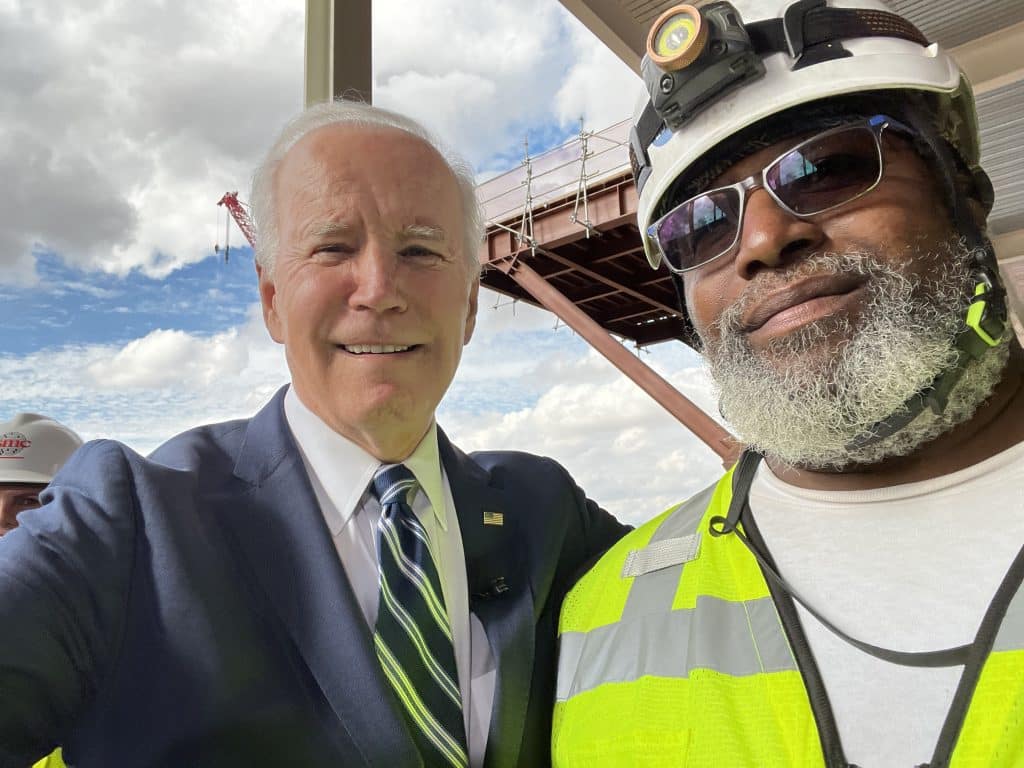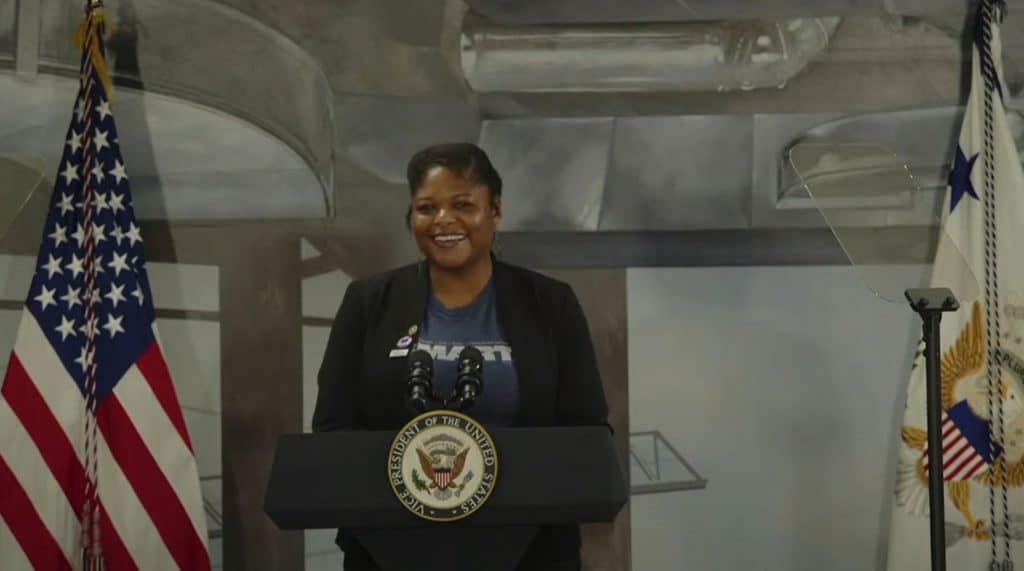Your vote, your union and the 2024 election
Every four years, election season changes the tone and tenor of life in the United States.
Attack ads flood our TV screens. Vitriolic arguments take place in the comment sections of Facebook, Instagram and YouTube. Family reunions are infiltrated by the latest manufactured culture wars. And politicians visit union halls across the country, seeking your endorsement — and your vote.
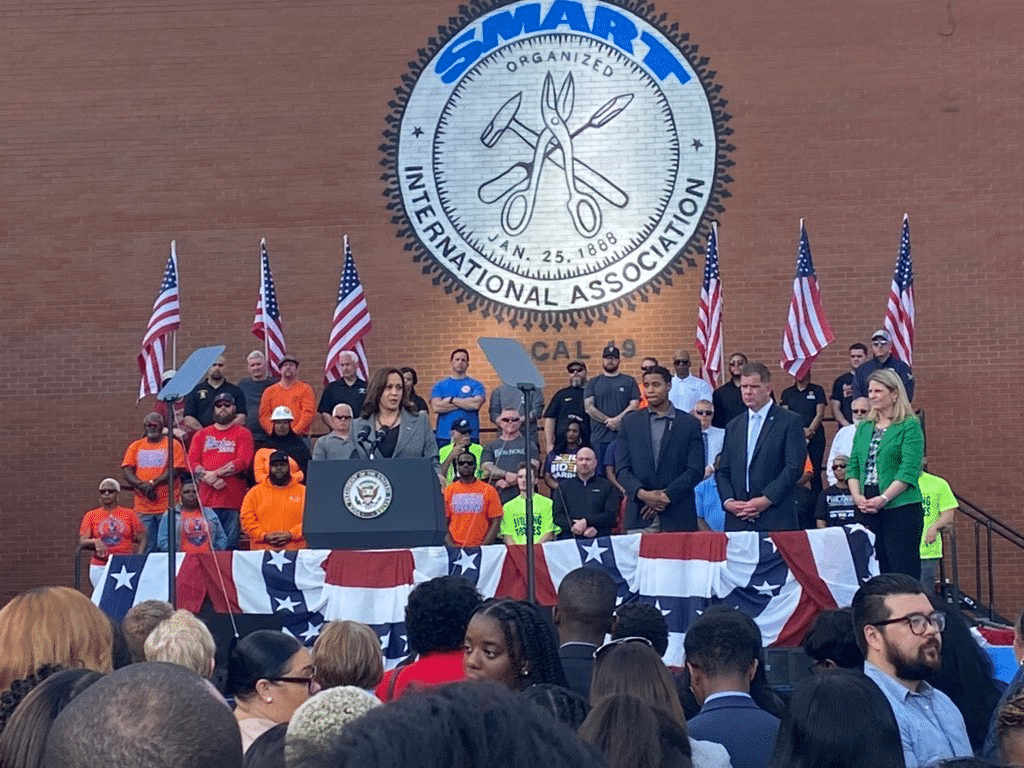
As a collective labor organization, we know that we depend on each other, not politicians, for our prosperity. But we also know that anti-labor politicians can severely damage our rights, our pensions, our safety and our futures.
Mainstream media outlets like to depict elections as complex, filled with minute details that might sway a voter’s decision one way or the other. As union members, though, we know that the reality is much simpler. It comes down to two questions: What actions have politicians taken to empower our union? And how will they enable us to win moving forward?
Delegates to the Third SMART General Convention in August voted to endorse Vice President Kamala Harris for president and Minn. Governor Tim Walz for vice president based on those questions. Harris’s and Walz’s actions demonstrate their commitment to helping SMART and working people win strong contracts, better workplace protections and higher pay. And their vision for our country is one that puts union labor first.
We can’t afford to go back
In his four years in the White House, Donald Trump and his administration enacted and attempted to implement some of the most anti-union actions the American worker has experienced in generations.
The Trump administration tried to gut our union apprenticeship programs with its Industry-Recognized Apprenticeship Programs proposal, a scheme that our union had to fight against tooth-and-nail to defeat.
The Trump administration withdrew the proposed two-person crew regulation SMART-TD had been working towards under the Obama administration — and then went a step further, actually attempting to preempt existing state two-person crew laws. This was an attack on our railroaders’ safety, jobs and pensions, as well as a direct threat to states’ rights.
The Trump administration’s National Labor Relations Board was legendarily anti-worker, with a general counsel who formerly worked as a management-side lawyer. The Trump NLRB made it more difficult for workers to picket a subcontractor; held that employers can legally monitor or search employees’ personal vehicles on company premises; and issued a decision making it easier for employers to restrict employees’ rights to talk to their coworkers about their union during work time, including asking a coworker to join the union, asking a coworker to vote to strike or asking a coworker to vote to ratify a contract.
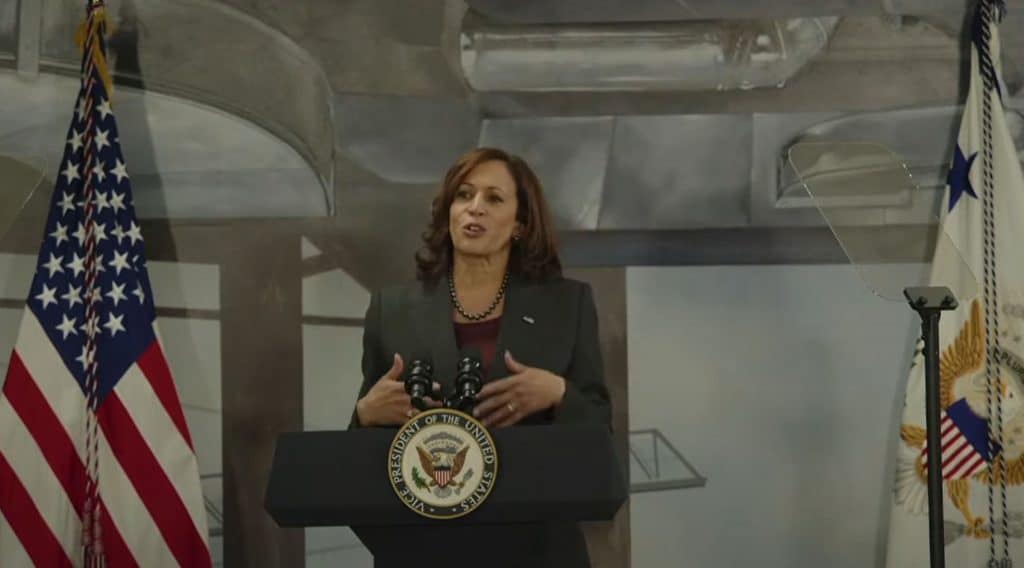
President Trump’s signature law, the flagrantly anti-worker Tax Cut and Jobs Act, encouraged offshoring of both paper profits and real production of U.S. multinational companies. It also eliminated the tax deduction members previously enjoyed for union dues.
President Trump signed an executive order that threatened funding for Social Security. He recommended vetoing the Protecting the Right to Organize (PRO) Act if it reached his desk. His administration encouraged firms to misclassify employees as independent contractors, lowering workplace standards and putting union jobs in jeopardy. President Trump rolled back protections against child labor and said he “loved right-to-work,” and his Justice Department successfully argued to make it the standard policy for government employees.
Those were only a few of his actions while in office — and the plan devised by his advisers for a potential return to power, Project 2025, spells out exactly what he intends to do next.
The document should alarm all of us for its attacks on public schools, Medicaid that our seniors rely on, and veterans’ ability to receive disability benefits. But the Trump Project 2025’s 37-page chapter on labor specifically targets our rights.
Project 2025 would prohibit project labor agreements, which consistently put our sheet metal members on jobsites across the nation. It would enable employers to get rid of workers’ unions in the middle of their contracts, and it would allow individual states to ban the existence of labor unions. Project 2025, if implemented, would gut local and state funding for public transit, hurting the sheet metal workers who build new transit infrastructure and public transit operators whose jobs depend on that funding. It would get rid of overtime guarantees and repeal labor and wage protections on federal projects.
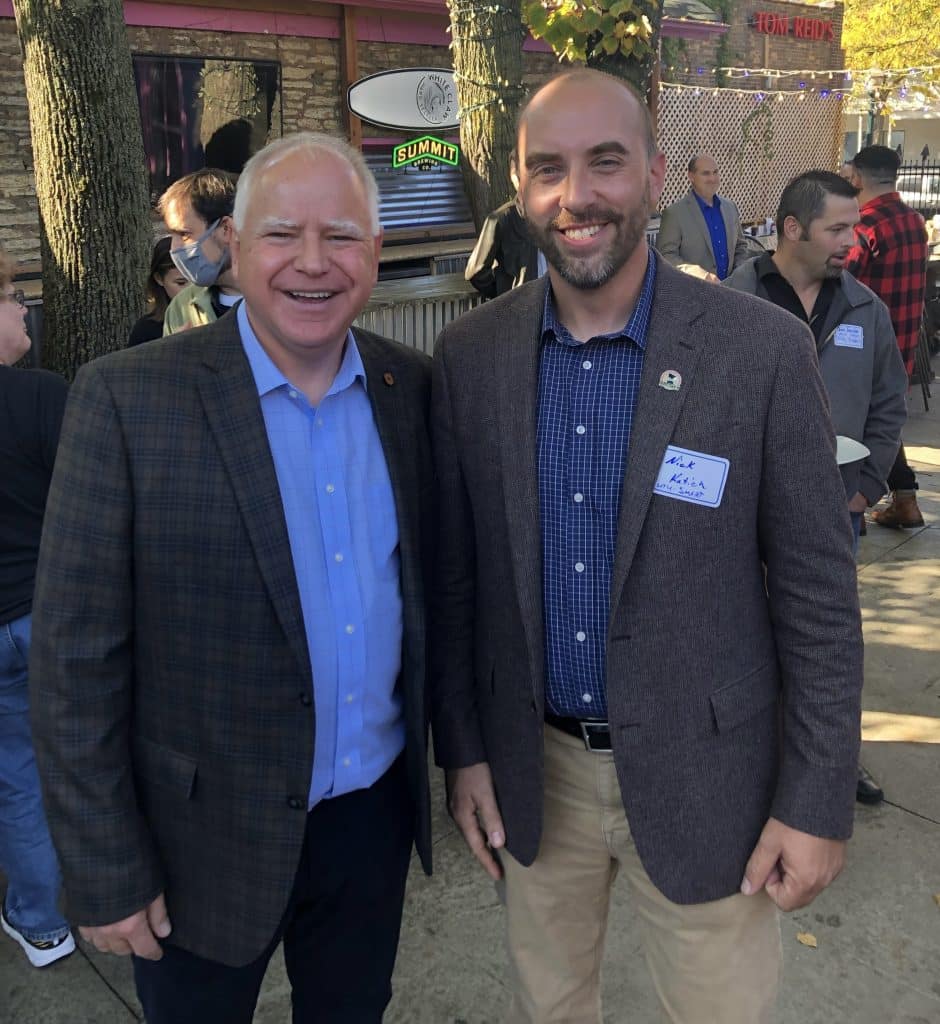
Under a second Trump administration, Project 2025 would make it harder for families to access unemployment insurance, eliminate child labor protections and enable businesses to violate the Occupational Safety and Health Administration (OSHA) without consequence. It would prevent companies from voluntarily recognizing workers’ unions. It would allow companies to retaliate against organizers, and it would actually enable employers to form company unions: supposed employee organizations with fake employee committees hand-picked by management.
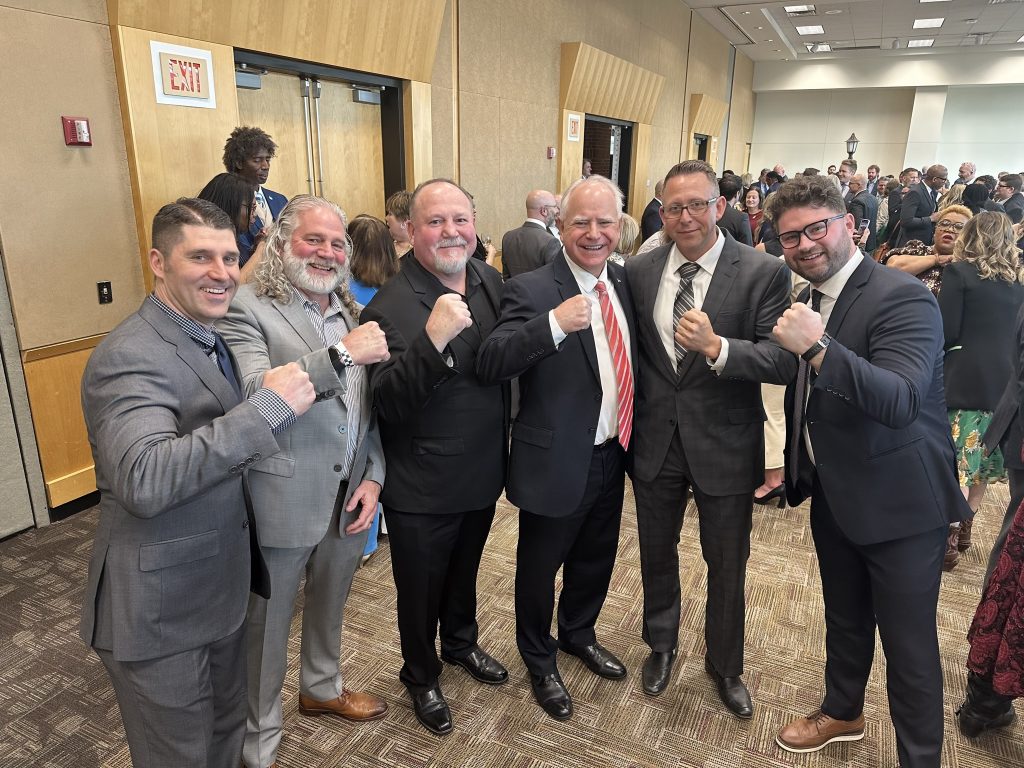
In other words, a second Trump administration would build on the actions of the first: It would jeopardize our livelihoods, put our health and safety at risk and threaten the very existence of our union.
Actions speak louder than words
The endorsement resolution presented to SMART convention delegates in August detailed the Harris-Walz ticket’s stellar pro-worker record. These candidates have acted in the interests of SMART members.
The Biden-Harris administration passed landmark laws that are funneling money towards SMART members’ jobs and livelihoods. As vice president, Harris cast the tiebreaking vote to pass the American Rescue Plan, which jumpstarted the U.S. economy, invested billions into reopening schools and indoor air quality, and allocated $100 million to OSHA for worker safety. Crucially for retirees, the ARP provided billions of dollars in union pension relief: saving the pensions of more than one million workers, including 1,600 Local 33 retirees in Massillon, Ohio. In this case, it was Harris’s vote that rewarded our retirees’ years of hard work and sacrifice.
The CHIPS and Science Act, meanwhile, invests in the U.S. semiconductor industry and American-made manufacturing. This has already put SMART sheet metal workers on huge projects everywhere from Vermont, to Ohio, to Arizona and beyond.
SMART members are also benefiting from the Bipartisan Infrastructure Law. Along with huge investments in traditional infrastructure like our nation’s railroad and public transportation systems, the law focuses on the industries in which sheet metal members work — like indoor air quality, energy efficiency and more — providing an enormous number of new jobs.
In 2022, Harris cast the tie-breaking vote to pass the Inflation Reduction Act. This law cuts healthcare prices for working families, fights climate change and holds the one percent accountable to pay their fair share in taxes. The IRA invests heavily in green energy infrastructure, with strong labor standards ensuring that SMART sheet metal workers will be in demand for this work.
Accompanying all these laws are strident, pro-worker regulations: the updating and strengthening of Davis-Bacon prevailing wage rules, the first-ever inclusion of apprenticeship standards in IRA tax cuts and the requirement of project labor agreements on federal jobs that cost more than $35 million, for example.
And that’s just on the legislative side. Just this year, the Biden-Harris Federal Railroad Administration and Department of Transportation announced a long-awaited federal two-person crew regulation, taking action to protect the jobs, safety and pensions of union railroaders. Additionally, the administration has demonstrated a strong commitment to protecting public transit and bus workers, addressing worker assaults in these sectors. This White House’s proactive stance on worker safety issues, including the Federal Transit Administration’s establishment of Public Transit Safety Plans, reflects a clear understanding of the challenges faced by frontline transportation employees and a dedication to creating safer working environments.
Walz, meanwhile, has an outstanding pro-worker record in Minnesota that leaves no doubt as to where his priorities lie.
On the transportation side, Walz made a number of SMART-TD railroad priorities the law of the land: requiring two-person crews on Minnesota freight trains, funding the Northern Lights Express — Amtrak’s passenger service between Duluth and Minneapolis — and bringing on two more state rail safety inspectors, plus additional funding for passenger rail corridor studies and railroad-provided first responder training. He is also the first and only governor in the nation to have signed legislation covering yardmaster hours of service.
Walz took similar action to advance the interests of SMART sheet metal workers when he signed a law that stipulates that the Minnesota Department of Commerce must establish and administer an air ventilation program to award grants to public school boards in Minnesota, with the grants covering work such as testing and balancing, HVAC and energy efficiency upgrades and much more. Importantly for SMART members, the bill specifically includes strong prevailing wage language that requires work covered by grants to “be performed by a skilled and trained workforce that is paid the prevailing wage rate … and of which at least 80 percent of the construction workers are either registered in or graduates of a registered apprenticeship program for the applicable occupation.”
Those are only some of Minnesota’s pro-union accomplishments under Walz. The legislature passed what most in the Minnesota building trades consider the most expansive prevailing wage enhancements in state history: from increased enforcement, to attaching the law to state funds, programs, energy projects and more. Walz also signed laws enacting paid sick leave for all workers; the banning of anti-union captive audience meetings; new protections for meatpackers, construction workers and Amazon employees; a huge expansion of paid family and medical leave; the largest-ever increase to the Minnesota work compensation system’s permanent partial disability fund; a universal free school breakfast and lunch program for the kids of working families; and more.
Harris’s and Walz’s actions speak far louder than words. They stood, and they continue to stand, with SMART members and our families.
A union-made future for SMART members and families
It’s clear what SMART members’ votes for Harris and Walz enabled your union to do in the past. What will our votes empower us to do next?
SMART has a vision for the future: one where union sheet metal and transportation workers build and move the critical infrastructure of our nation. One where SMART members earn better contracts, better pay, dignity at work and time to spend with their loved ones. One where our union continues to grow, representing with grit and pride every worker in our industries and trades.
The Harris-Walz ticket aligns with our vision. With Harris and Walz in the White House, we can build upon the progress we have made, continuing to implement the Bipartisan Infrastructure Law, CHIPS and Science Act and Inflation Reduction Act in a way that benefits SMART members. We can keep working with the DOT, FRA and FTA to protect transportation workers in the face of employer greed. If a pro-worker Congress takes power, we can pass the Railway Safety Enhancement Act, the PRO Act, the National Apprenticeship Act and much more. And with Harris’s proposed plans to cut price gouging and increase new housing production, we can reap the fruits of our labor while building the affordable homes our neighbors deserve.
Election day is fast approaching, and with it the accompanying noise. But when we enter the ballot box, we all need to remember those two vital questions: What actions have politicians taken to strengthen our union? And how will they help us win moving forward?
The answer is clear. Let’s secure our future.
